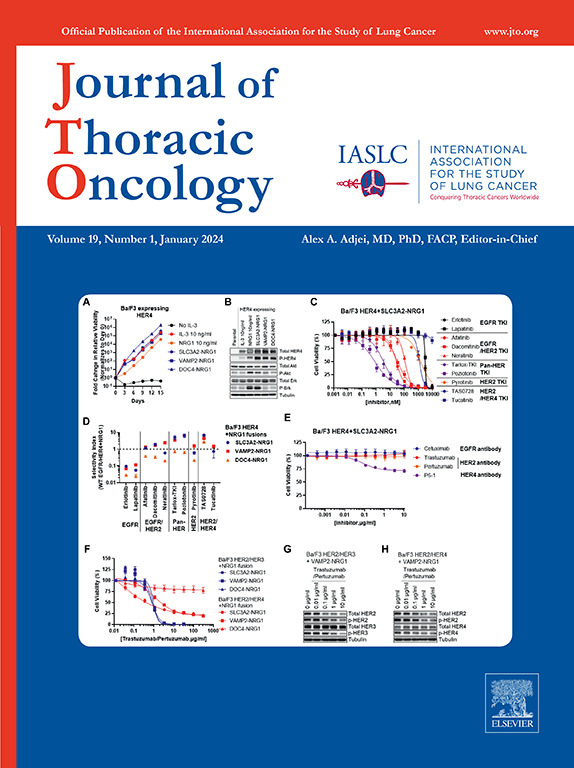可操作的非小细胞肺癌突变鉴定通过全面的基因组分析临床试验报名:欧洲计划的常规检测晚期肺癌患者(EPROPA)。
IF 21
1区 医学
Q1 ONCOLOGY
引用次数: 0
摘要
背景:为了缩小欧洲各国在分子检测和癌症治疗相关异质性方面的差距,欧洲妇女抗肺癌协会(WALCE)推动了欧洲晚期肺癌患者常规检测项目(EPROPA),并提供了一个免费的非小细胞肺癌样本表征的分子分析平台,旨在增加对可靶向驱动因素的检测,提高患者临床试验的可及性。方法:2021年1月至2023年12月,位于5个不同欧洲国家(希腊、斯洛文尼亚、罗马尼亚、阿尔巴尼亚和意大利)的20个中心加入了EPROPA, 555名晚期NSCLC患者注册入组。匿名患者的临床病理数据通过EPROPA网络平台共享,组织样本被收集到参考中心(都灵大学)的分子病理学单元进行分子分析。通过靶向的下一代测序方法进行了全面的基因组分析,并在分子肿瘤委员会(MTB)内讨论了分子报告,以评估患者是否有资格进行临床试验。结果:平均周转时间为8天,555份组织样品中只有30份(6%)不适合进行分子分析。在525个分析样本中,共鉴定出570个分子改变,其中包括264个致病的可靶向致癌改变和113个共发生突变。共有18个分子改变与潜在的生殖系和遗传性癌症综合征的影响已被报道。临床试验的确定考虑了205例患者。在讨论结核分枝杆菌后,30名患者被纳入欧洲现有的临床研究并接受治疗。接受匹配靶向治疗的可靶向分子改变患者的生存结果显着改善。结论:该数据证实了该计划在现实世界实践场景中的可行性和实用性,支持基于ngs的NSCLC样本分子表征的实施,以减少欧洲检测、药物和临床试验的不平等获取。本文章由计算机程序翻译,如有差异,请以英文原文为准。
Actionable NSCLC Mutation Identification by Comprehensive Genomic Profiling for Clinical Trial Enrollment: The European Program for the Routine Testing of Patients With Advanced Lung Cancer (EPROPA)
Introduction
The advocacy Women Against Lung Cancer in Europe (WALCE) promoted the European Program for the Routine Testing of Patients With Advanced Lung Cancer (EPROPA) and provided a free-of-charge molecular profiling platform for NSCLC sample characterization with the aim of increasing the detection of targetable drivers and improving patients’ access to clinical trials in Europe.
Methods
From January 2021 to December 2023, 20 centers located at five different European countries (Greece, Slovenia, Romania, Albania, and Italy) joined EPROPA, with 555 patients with advanced NSCLC registered to the program. Anonymized patients’ clinical-pathological data were shared through the EPROPA web platform and tissue samples were collected at the Molecular Pathology Unit of the Reference Center (University of Turin) for molecular analyses. A comprehensive genomic profiling by a targeted next-generation sequencing approach has been performed and molecular reports have been discussed within the molecular tumor board to assess patients’ eligibility for clinical trials.
Results
The average turnaround time was eight days, with only 30 out of 555 tissue samples (6%) not suitable for molecular analysis. In the 525 analyzed samples, a total of 570 molecular alterations have been identified, including 264 pathogenic targetable oncogenic alterations and 113 cases with co-occurring mutations. A total of 18 molecular alterations with potential germline and hereditary cancer syndrome implications have been reported. The identification of a clinical trial was considered for 205 patients. After molecular tumor board discussion, 30 patients were enrolled and treated in clinical studies available in Europe. Survival outcomes were significantly improved in patients with targetable molecular alterations receiving a matched targeted therapy.
Conclusion
This data confirmed the feasibility and usefulness of the program in the real-world practice scenario, supporting the implementation of next-generation sequencing–based molecular characterization of NSCLC samples, to reduce the unequal access to tests, drugs, and clinical trials in Europe.
求助全文
通过发布文献求助,成功后即可免费获取论文全文。
去求助
来源期刊

Journal of Thoracic Oncology
医学-呼吸系统
CiteScore
36.00
自引率
3.90%
发文量
1406
审稿时长
13 days
期刊介绍:
Journal of Thoracic Oncology (JTO), the official journal of the International Association for the Study of Lung Cancer,is the primary educational and informational publication for topics relevant to the prevention, detection, diagnosis, and treatment of all thoracic malignancies.The readship includes epidemiologists, medical oncologists, radiation oncologists, thoracic surgeons, pulmonologists, radiologists, pathologists, nuclear medicine physicians, and research scientists with a special interest in thoracic oncology.
 求助内容:
求助内容: 应助结果提醒方式:
应助结果提醒方式:


